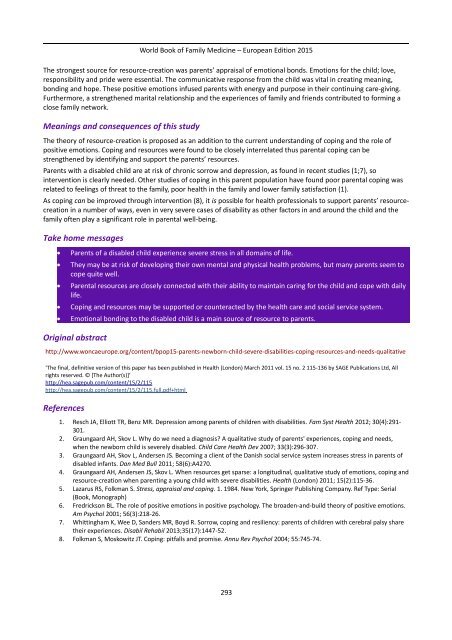Family Medicine
World Book 2015
World Book 2015
You also want an ePaper? Increase the reach of your titles
YUMPU automatically turns print PDFs into web optimized ePapers that Google loves.
World Book of <strong>Family</strong> <strong>Medicine</strong> – European Edition 2015<br />
The strongest source for resource-creation was parents’ appraisal of emotional bonds. Emotions for the child; love,<br />
responsibility and pride were essential. The communicative response from the child was vital in creating meaning,<br />
bonding and hope. These positive emotions infused parents with energy and purpose in their continuing care-giving.<br />
Furthermore, a strengthened marital relationship and the experiences of family and friends contributed to forming a<br />
close family network.<br />
Meanings and consequences of this study<br />
The theory of resource-creation is proposed as an addition to the current understanding of coping and the role of<br />
positive emotions. Coping and resources were found to be closely interrelated thus parental coping can be<br />
strengthened by identifying and support the parents’ resources.<br />
Parents with a disabled child are at risk of chronic sorrow and depression, as found in recent studies (1;7), so<br />
intervention is clearly needed. Other studies of coping in this parent population have found poor parental coping was<br />
related to feelings of threat to the family, poor health in the family and lower family satisfaction (1).<br />
As coping can be improved through intervention (8), it is possible for health professionals to support parents’ resourcecreation<br />
in a number of ways, even in very severe cases of disability as other factors in and around the child and the<br />
family often play a significant role in parental well-being.<br />
Take home messages<br />
<br />
<br />
<br />
<br />
<br />
Parents of a disabled child experience severe stress in all domains of life.<br />
They may be at risk of developing their own mental and physical health problems, but many parents seem to<br />
cope quite well.<br />
Parental resources are closely connected with their ability to maintain caring for the child and cope with daily<br />
life.<br />
Coping and resources may be supported or counteracted by the health care and social service system.<br />
Emotional bonding to the disabled child is a main source of resource to parents.<br />
Original abstract<br />
http://www.woncaeurope.org/content/bpop15-parents-newborn-child-severe-disabilities-coping-resources-and-needs-qualitative<br />
‘The final, definitive version of this paper has been published in Health (London) March 2011 vol. 15 no. 2 115-136 by SAGE Publications Ltd, All<br />
rights reserved. © [The Author(s)]’<br />
http://hea.sagepub.com/content/15/2/115<br />
http://hea.sagepub.com/content/15/2/115.full.pdf+html<br />
References<br />
1. Resch JA, Elliott TR, Benz MR. Depression among parents of children with disabilities. Fam Syst Health 2012; 30(4):291-<br />
301.<br />
2. Graungaard AH, Skov L. Why do we need a diagnosis? A qualitative study of parents' experiences, coping and needs,<br />
when the newborn child is severely disabled. Child Care Health Dev 2007; 33(3):296-307.<br />
3. Graungaard AH, Skov L, Andersen JS. Becoming a client of the Danish social service system increases stress in parents of<br />
disabled infants. Dan Med Bull 2011; 58(6):A4270.<br />
4. Graungaard AH, Andersen JS, Skov L. When resources get sparse: a longitudinal, qualitative study of emotions, coping and<br />
resource-creation when parenting a young child with severe disabilities. Health (London) 2011; 15(2):115-36.<br />
5. Lazarus RS, Folkman S. Stress, appraisal and coping. 1. 1984. New York, Springer Publishing Company. Ref Type: Serial<br />
(Book, Monograph)<br />
6. Fredrickson BL. The role of positive emotions in positive psychology. The broaden-and-build theory of positive emotions.<br />
Am Psychol 2001; 56(3):218-26.<br />
7. Whittingham K, Wee D, Sanders MR, Boyd R. Sorrow, coping and resiliency: parents of children with cerebral palsy share<br />
their experiences. Disabil Rehabil 2013;35(17):1447-52.<br />
8. Folkman S, Moskowitz JT. Coping: pitfalls and promise. Annu Rev Psychol 2004; 55:745-74.<br />
293


